Wirehaired Vizslas Harry (left), Vincent (right) and Poppy (back)
Wirehaired VEESH-la
The head of the Wirehaired Vizsla is lean and noble. The skull is moderately wide between ears with a median line down the forehead and a moderate stop. The skull is a little longer than muzzle. Muzzle, although tapering, is well squared at the end. The nostrils are well developed, broad and wide. Jaws are strong and powerful. Lips cover jaws completely and are neither loose nor pendulous. The color of the nose is brown. Eyes are neither deep nor prominent, of medium size and are a shade darker in color than coat. Slightly oval in shape, eyelids fitting tightly. Yellow or black eyes are undesirable. Ears are moderately low set, proportionately long with a thin skin and hanging down close to cheeks. Rounded "V" shape, not fleshy. The mouth is sound and has strong white teeth. Jaws are strong with perfect, regular and complete scissor bite, i.e. upper teeth closely overlapping lower teeth and set square to the jaws. Full dentition desirable. The neck is strong, smooth and muscular, moderately long, arched and devoid of dewlap. The shoulders are well laid and muscular, elbows close to body and straight, forearm long, pasterns upright. The back level is short, well-muscled, withers high. Chest is moderately broad and deep with prominent breast bone. Distance from withers to lowest part of chest equal to distance from chest to ground. Ribs are well sprung and belly has a slight tuck-up beneath loin. Croup is well muscled. Hindquarters are straight when viewed from rear, thighs well developed with moderate angulation, hocks well let down. The feet are round with toes short, arched and tight. Cat-like foot is required, hare foot undesirable. Nails short, strong and a shade darker in color than coat, dewclaws should be removed. The gait/movement is graceful, elegant with a lively trot and ground covering gallop. The tail is moderately thick, rather low set, customarily one-third docked. When moving, carried horizontally. Hair on head short and harsh, longer on muzzle, forming beard. Pronounced eyebrows. Longer and finer on ears. Longer over body, fitting closely to neck and trunk. Short harsh hair fitting closely and smoothly to forelimbs. Coat color is russet gold. Small white marks on chest and feet should not be penalized.
The Wirehaired Vizsla is expressive, gentle and loving. Keen and trainable to a high degree, it needs daily mental stimulation. It needs a patient, calm, firm hand. If it does not see you as a strong authority figure it will become stubborn. Reliable with children, loves to play for hours. Without extensive daily exercise it may be too energetic and excitable for very young toddlers, but is excellent for energetic kids. Able to adapt quickly to family life, and is generally good with other dogs. Wirehaired Vizslas are very athletic, and when lacking in exercise they may become destructive or neurotic. Socialize them well to people, places, noises, dogs and other animals. It is very important to obedience train your Wirehaired Vizsla. Without enough exercise, it can be overly eager, prancing around you in sheer excitement. This breed is highly trainable and very willing to please; if you can get it to understand exactly what it is you want of it. If you do not train this breed it may become difficult to handle and control. Example: See Video of a Vizsla that needs more exercise. Notice how very eager to please the dog is, yet has more built up energy than she knows what to do with. She is obviously stressed and not relaxed. Wirehaired Vizslas tend to chew. This breed is not for everyone. If you want a calm dog and are not willing to walk a couple of miles or jog at least one mile a day, do not choose a Wirehaired Vizsla. Without proper exercise, this breed can easily become high-strung. They have many talents such as: tracking, retrieving, pointing, watchdog and competitive obedience. The Wirehaired Vizsla is a hunting dog and may be good with cats they are raised with, but should not be trusted with animals such as hamsters, rabbits and guinea pigs etc. Be sure to always be your dog’s pack leader to avoid any negative behaviors such as guarding furniture, food, toys, and so on. Well-balanced Wirehaired Vizslas that receive enough exercise, and have owners that are true pack leaders, will not have these issues. These behaviors can be reversed, once the owners start displaying leadership, discipline, and provide enough exercise, both mental and physical.
Height: Males 22.5 - 25 inches (57 - 64 cm) Females 21 - 23.5 inches (53 - 60 cm)
Weight: Males 45 - 60 pounds (20 - 27 kg) Females 40 - 55 pounds (18 - 25 kg)
Prone to hip dysplasia.
The Wirehaired Vizsla is not recommended for apartment life. It is moderately active indoors and does best with at least an average-sized yard.
This is an energetic working dog with enormous stamina. It needs to be taken on daily, long, brisk walks or jogs. In addition, it needs plenty of opportunity to run, preferably off the leash in a safe area. If these dogs are allowed to get bored, and are not walked or jogged daily, they can become destructive and start to display a wide array of behavioral problems.
About 12-15 years.
About 5 to 10 puppies
The wirehaired coat is harsh, hard and loose fitting, with no gloss. There is a winter undercoat and the hair forms a brush on the back part of the forelegs. It is easy to keep in peak condition. Brush with a firm bristle brush, and dry shampoo occasionally. Bathe with mild soap only when necessary. The nails should be kept trimmed. These dogs are average shedders.
The creation of the Wirehaired Vizsla started in the 1930s. It was noticed that some Vizslas had thicker coats which gave them better protection in cover and water. One of these thicker coated females was crossed with a German Wirehaired Pointer. The breeder who did this was Mr. Vasas Jozsef. He tried two such matings with the same male and different females. The Wirehaired Vizsla has two cousins, the Smooth Vizsla and the other, a rare longhaired Vizsla. The longhaired can be born in both smooth and wire litters, although this is quite a rare occurrence. The longhaired Vizslas are not registered anywhere in the world but there are some to be found in Europe. The Wirehaired Vizsla was officially recognized by the AKC in 2014.
Gun Dog
Very young female Wirehaired Vizsla puppies, bred by Palownia's Wirehaired Vizslas
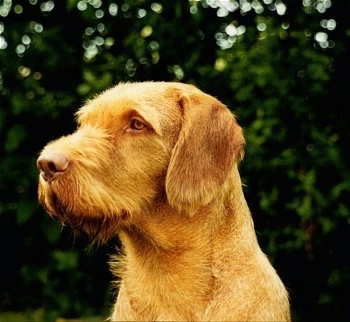
Photo courtesy of Silvanus Hungarian Wirehaired Vizslas
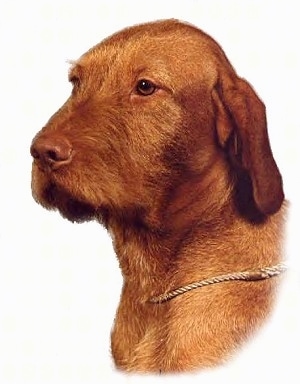
Photo courtesy of Silvanus Hungarian Wirehaired Vizslas
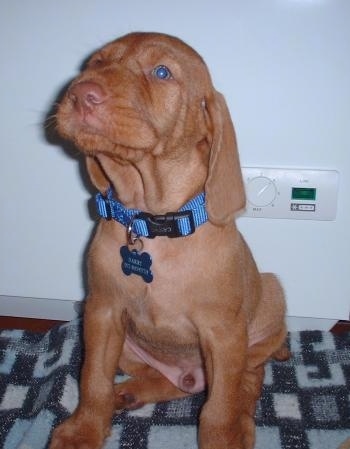
Harry AKA Kisdon's Russian Hero as a puppy
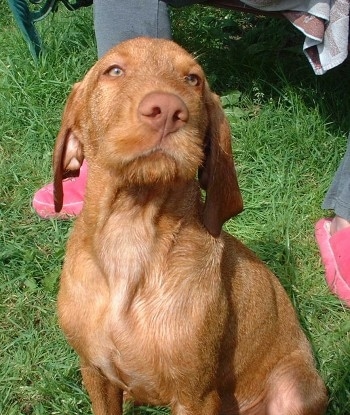
Harry grew...
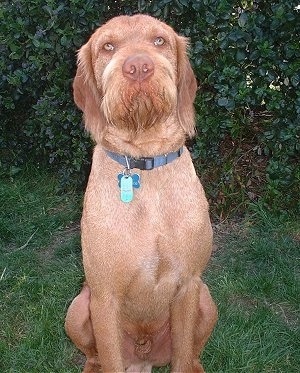
…And grew...Harry at 1 year…
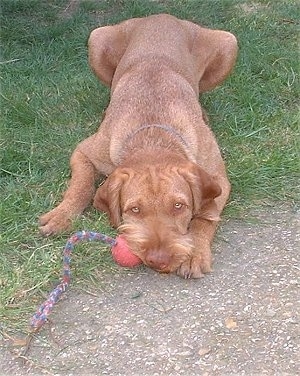
Happy Birthday, Harry!